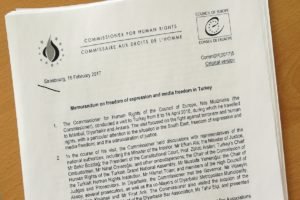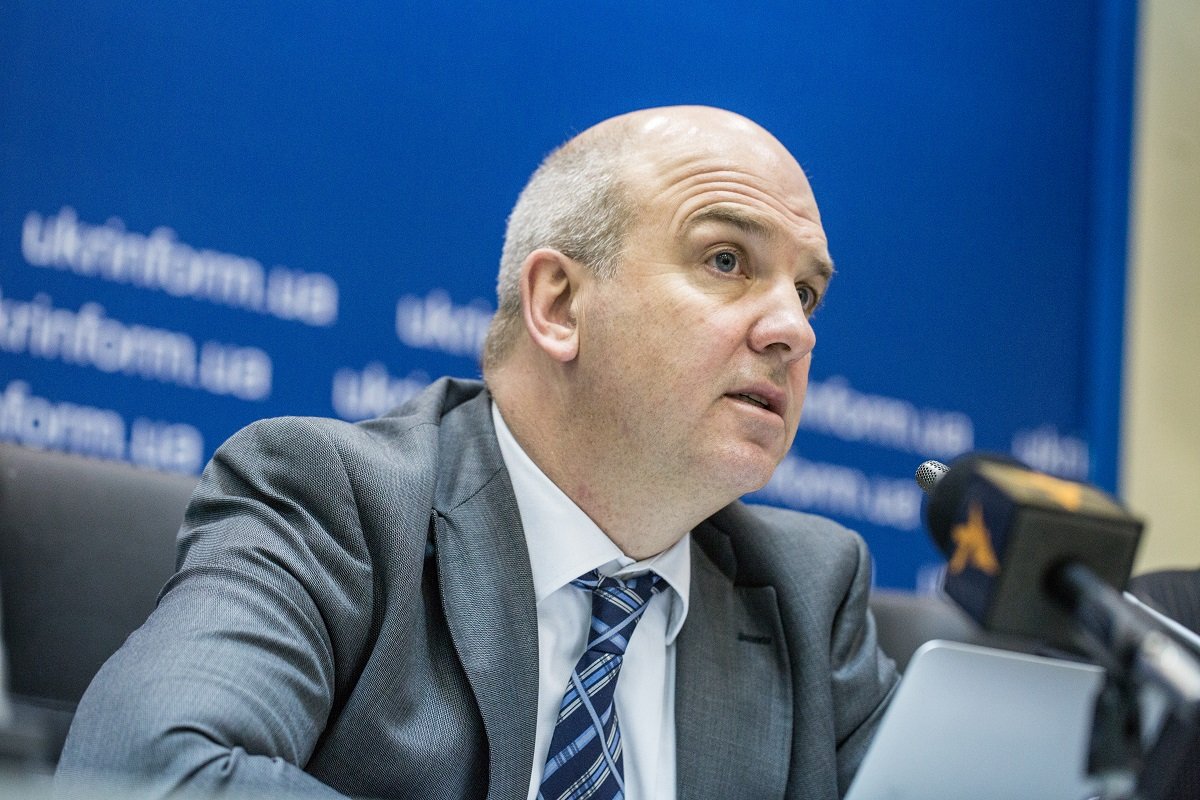
Releasing a memorandum on freedom of expression and media freedom in Turkey based on the findings of his visits to Turkey last year, Muižnieks said “The space for democratic debate in Turkey has shrunk alarmingly following increased judicial harassment of large strata of society, including journalists, members of parliament, academics and ordinary citizens, and government action which has reduced pluralism and led to self-censorship.”
He added that “neither the attempted coup, nor other terrorist threats faced by Turkey can justify measures that infringe media freedom and disavow the rule of law to such an extent”.
The Commissioner made a point that the current situation in Turkey is characterized by numerous, blatant violations of principles enshrined in the European Convention on Human Rights (ECHR), the case-law of the European Court of Human Rights (ECtHR), COE’s standards as well as other relevant international standards.
COUNTLESS EXAMPLES OF UNDUE RESTRICTIONS OF MEDIA FREEDOM
The report said “this overwhelmingly negative assessment of the Commissioner reflects an overview of countless examples of undue restrictions of media freedom and freedom of expression which have occurred in Turkey in recent years”.
It recalled how critical media was seized by the government long before the failed coup, citing the violent takeover of the Koza İpek holding company by court-appointed trustees on October 2015 and the seizure of Feza group that published Zaman and Today’s Zaman dailies on March 2016.
The Commissioner said that a total of 158 media companies had been closed down as of 11 January 2017 by merely executive decisions which were taken without any involvement of the judiciary and were not subject to any review by a court of law. These included 45 newspapers, 60 TV and radio stations, 19 periodicals, 29 publishing houses and 5 press agencies.
“The authorities should urgently change course by overhauling criminal legislation and practice, re-develop judicial independence and reaffirm their commitment to protect free speech” top human rights advocate said of Turkey, lamenting on what he called halting and reversing gains that were achieved painstakingly by Turkey in co-operation with the CoE.
Muižnieks criticized Turkey for wide application of the concepts of terrorist propaganda and support for a terrorist organization, including to statements and persons that clearly do not incite violence, and its combination with an overuse of defamation. He pointed out that “legitimate dissent and criticism of government policy is vilified and repressed, thus shrinking the scope of democratic public debate and polarizing society.”
The report explains how the situation has significantly worsened under the on-going state of emergency which gave limitless discretionary powers to the Turkish executive to apply sweeping measures, including against the media and non-governmental organizations (NGOs) without any evidentiary requirement, in the absence of judicial decisions and on the basis of vague criteria of alleged “connection” to a terrorist organization.
“CHANGE COURSE AND DISPLAY THE RESPONSIBILITY AND TOLERANCE”
Media pluralism and independence, in particular, have been casualties of these developments characterized notably by the use of state resources to favor pro-governmental media, pervasive internet censorship, arbitrary exclusion of media and journalists, takeover or closure of media outlets critical to the authorities, violence and reprisals against media workers and the incarceration of over 150 journalists.
The Commissioner also underscores that this deterioration goes hand-in-hand with the erosion of the independence and impartiality of the Turkish judiciary. “While this problem affects the whole judiciary, it is in particular the role of the criminal judges of peace that is the most concerning, because these formations have transformed into an instrument of judicial harassment to stifle opposition and legitimate criticism and are now at the origin of some of the most obvious violations of the right to freedom of expression.”
The Commissioner urged the Turkish political leaders in the strongest possible terms to change course and to display the responsibility and tolerance expected in a democratic society. “A first step is to lift the current state of emergency and reverse the numerous unacceptable infringements of freedom of expression, and in particular media freedom and academic freedom, that it engendered. In addition, the Turkish authorities must completely overhaul the Criminal Code and the Anti-Terrorism Law so as to align law and practice with the jurisprudence of the European Court of Human Rights,” he remarked.
“Beyond these deficiencies, it is crucial to change a judicial culture where judges and prosecutors interpret and apply laws in a way that consistently undermines freedom of expression and media freedom in Turkey,” CoE Human Rights Commissioner added.
Feb. 15, 2017
















